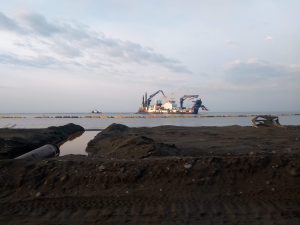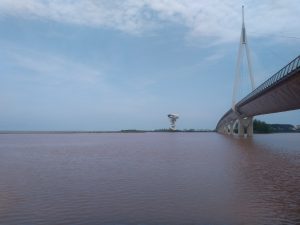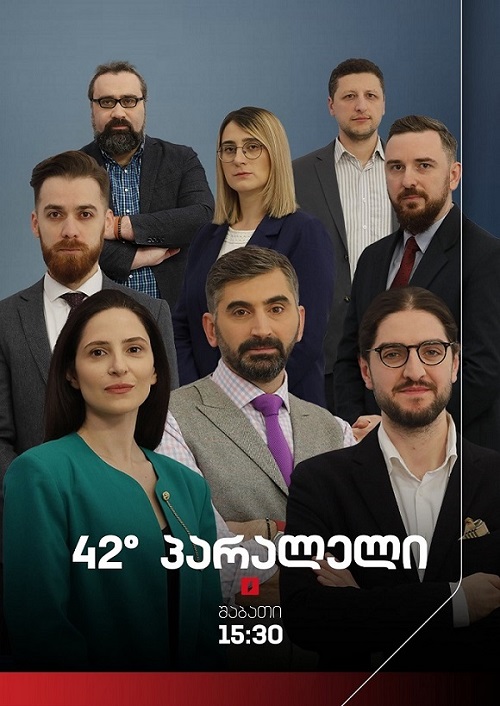Evelina Gambino is a Ph.D student in the Geography Department at UCL. Her work focuses on large infrastructural projects in the Republic of Georgia. Through an ethnographic approach, she explores the movements of financial capital, the labour relations, narratives, expectations and conflicts emerging around two key sites of Georgia’s logistical future. Evelina’s work has appeared in academic journals and online publications including Geopolitics; Work, Organisation, Labour, Globalisation (WOLG); Caucasus Analytical Digest (CAD); Euronomade; Lo Squaderno; and edited collections published by Duke University Press and Werkleitz Festival.
The Georgian government has just announced the termination of the contract with Anaklia Development Consortium (ADC) for the development of the Anaklia Deep Sea Port Project. The deep sea port, set to appear only few kilometres from the border with the defacto state of Abkhazia, is hailed as the most important development of Georgia’s bid to become a strategic hub of the Belt and Road Initiative. In the past year, the port construction has been at the centre of a growing controversy between the Georgian government and the company in charge of its implementation. While news of the contract’s termination isn’t surprising, having followed the developments of the past few months, it still marks an important moment in the seemingly never ending story of this planned infrastructure. Reading the comments that have started to appear, a familiar narrative emerges: the one of a clash between titans, the big men of Georgia’s political scene. On one side we have Mamuka Khazaradze, former CEO of Anaklia Development Consortium and Georgia’s biggest private bank TBC and on the other we have Bidzina Ivanishvili, leader of the governing party Georgian Dream.

Reactions to the progressive crisis of ADC are divided in two positions: one, following the government, that ADC did not comply with its obligations and that therefore it was the government’s duty to terminate the contract for the project and the other, advanced by Khazaradze and accepted by a fair amount of commentators and the public alike, that this was a personal vendetta by Ivanishvili against Khazaradze and a ploy to take back control of the project and the country. As someone that has been studying this development for over two years I feel both these narratives should be questioned.
The questions are many but in order to begin unpacking them we should start by looking at the space of Anaklia and what has been happening within it while this conflict is unfolding.
Currently in Anaklia the territory that was set to host the port is left in a semi abandoned state. Over the past months a thick dust has been lifted from the construction site and carried by the wind into the houses of local inhabitants, reportedly causing serious allergic reactions and damage to the eyes of children and other villagers alike. The dust has also impacted the tourist season, as some of the guest-houses adjacent to the port territory have been forced to close. As it lands on the surfaces of the newly built guesthouses, polluting the immaculate sheets of their bedrooms and spoiling the long-awaited earnings of many inhabitants who have invested in the tourist business, this black sand becomes an index of the deeper processes that have affected the life of the Anaklians in the past decade of infrastructural speculation.
The promise of the port, and of the project that preceded it: Saakashvili’s failed plans to build a futuristic city, has dramatically altered the structure of life in the village, at times creating new winners, such as those who received compensation from their relocation away from the port territory, but most strikingly it has laid the ground for many new potential losers. Throughout the attempts to turn this remote borderland into a logistics hub, the entire life of the village, and the territory surrounding it has been caught in a suspended temporality, a seemingly perpetual waiting for a better, richer future. This suspension has, in turn, had material effects with people attempting to capitalise on the promise of development by investing in property for which, in many cases, they had to take substantial loans – often from the very same bank that is in charge of the port development. The repayments of these loans have started getting more difficult to mange as the promise of development seemed to recede into an ever more distant horizon. Those who were lucky enough to not have to rely on loans, namely the several families that received compensation for their territories that lied on the site of the port development, are in many cases also caught in the anxious loop of suspension, having oriented their entire lives towards a tourist boom that, despite being promised by the state and the company alike, is yet to arrive. In the past decade the landscape of Anaklia has been brutalised by failed speculations and tourist developments, rusty buildings that now lie abandoned on the seashore, making for a truly dystopian sight. Today the abandoned territory of the port of Anaklia joins this cemetery of failed investments. Together these carcasses lie as monuments to the ever repeating failure of Georgia’s own brand of market-led development. Behind the waves of investment in the village is a murky dream of geopolitical affirmation and geo-economic ambition unchanging since the time of Saakashvili.
The problem, then, is not why or if Anaklia Development Consortium has failed to comply to its contractual duties, but how can a multi-million logistical hub ever be developed on a precarious borderland in the absence of a comprehensive transport strategy document that would ensure its interaction with other infrastructure in the country and internationally? Discussing with a government official during the fieldwork I undertook for my ongoing PhD research, I learnt that the Georgian government was still discussing such a document in the autumn of 2019, years after the beginning of the works in Anaklia.

At the centre of the controversy that lead to the contract’s interruption is the demand made by potential investors to receive a guarantee on their future earnings. While this shows the boldness of ‘free market’ proponents in demanding that the state removes any sorts of barrier to these investors’ profit, this ridiculous demand also results directly from the unwillingness of Georgian Dream party to overcome the neoliberal ideology aggressively implemented by its predecessor – Mikhail Saakashvili – that rested on deployment of the state and its assets as a vehicle for the proliferation of private capital. During Saakashvili’s presidency, furthermore, key infrastructural assets of the country were privatised leaving Georgia without control of its own logistics. On the 100km of the Georgian Black Sea coast can be counted a staggering number of maritime logistics infrastructure: a port and container terminal in Batumi, the Supsa and Kulevi oil terminals and the port of Poti, all of which are operated by foreign companies with long term concessions or outright ownership, and that are therefore outside the control of the state. Rather than attempting to revert this process, the current government has continued exploiting its natural environment and undermining its fragile ecosystems by authorising further large scale investments in all fields. Already, the implementation of some of these investments is threatening the livelihoods of parts of the population. Furthermore, the Georgian Dream governments have consolidated their commitment to prioritising the interests of private investors to the detriment of the protection of most basic workers’ rights. Finally, through the many FTAs signed in the last few years, Georgia has further opened its underdeveloped internal market to the competition of much stronger economies such as China and India.
Amidst the lack of a sustainable development strategy, Anaklia Port has come to be seen as a salvific infrastructure that will magically solve all of the country’s problems – from unemployment to its precarious geopolitical situation. However the basic infrastructures to back such spectacular investment are not in place, and once more Georgia has come to be at the mercy of private investors and a joint stock company whose main stakeholder has absolutely no experience in operating a logistics infrastructure. The demise of Anaklia port is not special; the entire world is dotted by failed infrastructural projects that were abandoned because of lack of capital investment. However, looking at all of these infrastructural ruins, one can’t help but ask: when will we learn that in order to foster development a proper strategy must be put in place? One that is geared at the creation of a substantive economy that starts from the needs of the population and brings together productive activities with the reproduction of the people necessary to carry them forward.
During the last year of the works in Anaklia, ADC partnered with USAID to promote a two million dollars program geared at fostering local development. The program included short training in different crafts, business development, language and IT training and a number of small and medium grants for projects developed by local entrepreneurs as well as small infrastructural interventions tackling some of the village’s lacks in provision. Such efforts, however, are one more example of a global tendency to treat structural problems such as a lack of employment opportunities and scarce infrastructural provision as something that should be solved through the corporate social responsibility strategy of a private company, rather than the issues at the very core of a country’s development strategy. By training locals to set up their own small businesses or partake in the tourist boom, moreover, programs such as the one implemented by ADC and USAID leave largely unattended the fundamental problem of lack of skilled workforce in the country. While the company has pledged to employ 90% of its construction workforce amongst the country’s population, these have mostly been low skilled workers and entire teams of skilled employees have come from the foreign contractor companies such as Van Oord. Effectively failing to overcome a division of labour that has been typical across large infrastructural projects in developing countries.
Amidst the lack of sustained intervention that has characterised Anaklia’s recent past, locals have gathered around the current infrastructural development in the hope that life might become a little easier, a little less precarious, a little less exhausting. Now the Anaklia Port project is halted and this simple hope is shattered once more. What they are left with it’s a giant dusty hole where houses and small plots of land used to be, now left empty until the next spectacular project will be announced.
დოკუმენტში გამოთქმული მოსაზრებები ეკუთვნის ავტორს და შეიძლება არ ემთხვეოდეს საზოგადოებრივი მაუწყებლის პოზიციას.



